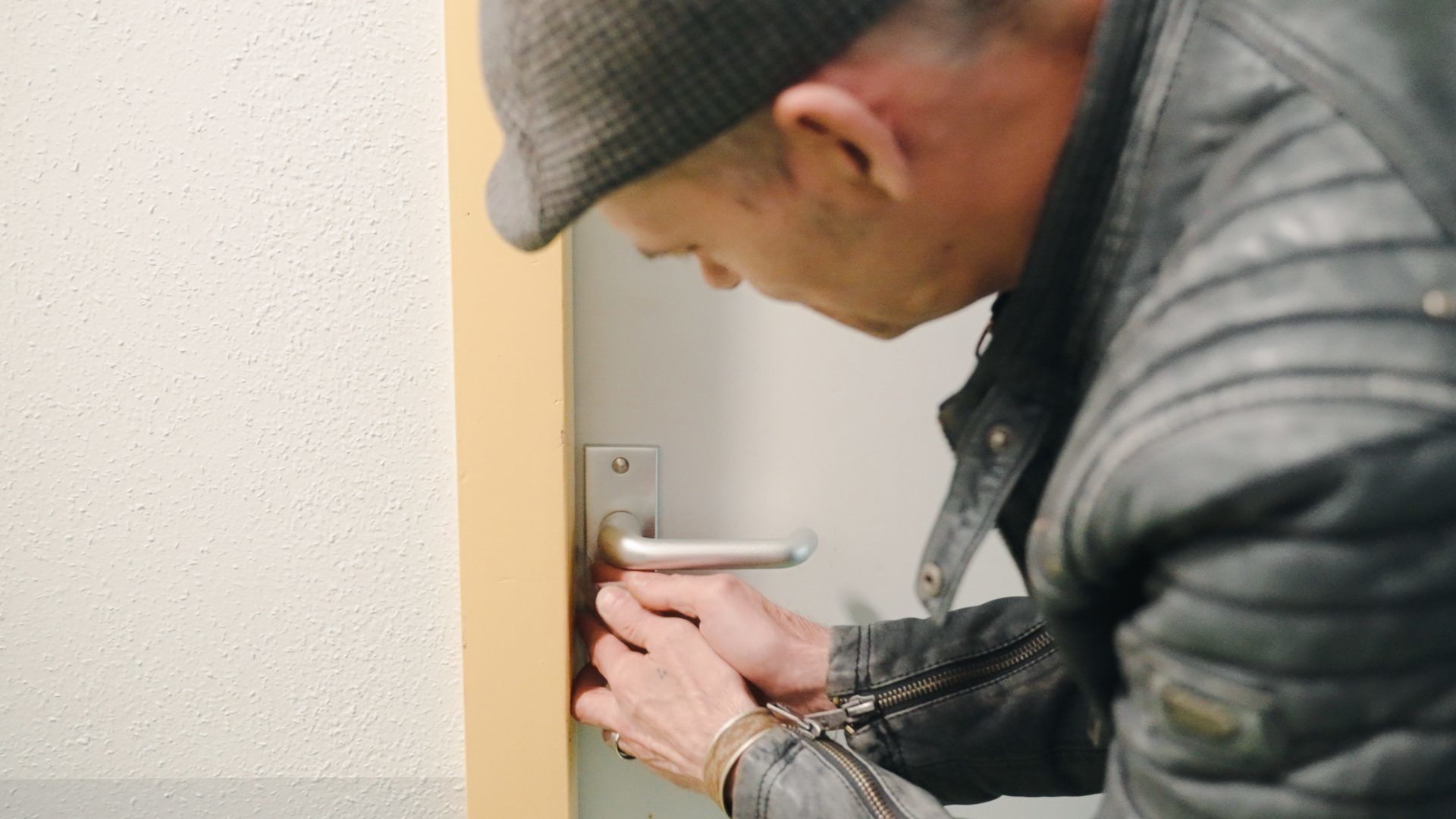How secure is student housing? On the road with a former burglar
-
 Former burglar Danny shows how doors can be opened without bruteforcing the lock. Photo by Johannes Fiebig.
Former burglar Danny shows how doors can be opened without bruteforcing the lock. Photo by Johannes Fiebig.
‘Keep your windows shut and make sure to lock up when you leave your house.’ Both the police and student housing company SSH& tend to give out the most obvious tips on burglary prevention. But what do actual burglars look out for, and why are student houses such a favoured target? Vox took a walk with a former burglar to find out.
‘You can roll the bins right up against the wall here and then grab hold of the edge of the roof. I can climb up here in no time at all’, according to Danny, a former burglar. ‘I mean could have climbed!’, he quickly corrects himself. Danny has been out of the criminal life for two and a half years, and nowadays he does volunteer work at Stadswandeling Vagebond. This is an organisation that shows the city from the perspective of homeless people; Danny himself was homeless for eight months.
His time on the street made an impact. After having been addicted to heroin and other hard drugs for 32 years, Danny decided to turn his life around. He stopped doing crimes and poured himself into rehab with everything he had. Quitting completely is still extremely difficult; Danny is down to a so-called ‘maintenance dose’, but he’s on the right track.
City walk
Standswandeling Vagebond organises city walks throughout Nijmegen, Arnhem and Apeldoorn, which are led by (former) homeless people. One of the organisation’s founders is Bernard, who started living on the street and became addicted to alcohol after his marriage broke down. Now, he tries his best to nuance society’s negative image of homeless people. During the city tours, the guides talk about their experiences: how they lived and which places in the city hold special meaning to them. The tours are hosted on demand. For more information, see Stadswandeling Vagebond’s website.
Besides telling people his story, Danny wants to use his work for Vagebond (see insert, ed.) to keep others from becoming burglars. Now that people are opening their windows again because of the nice weather, the opportunistic thief can easily make a move, especially at student houses. During our walk, Danny shows the city centre and East Nijmegen through his eyes: how susceptible are student houses to burglars? Can landlords do more to protect their residents, or is inaction on the part of students the main cause of the recent string of burglaries among this group?
Drainpipe
Our walk begins at a large student housing building in the city centre. Danny becomes enthusiastic as soon as he lays eyes on it. ‘You can climb those drainpipes in no time.’ It looks like an ordinary drainpipe, and the part of the roof it attaches to does not look very inviting. But appearances can be deceiving. Danny: ‘Some of these drainpipes have pins at the top. If you try to pull yourself up by the edge of the roof, you’ll get gashes in your chest, so you wouldn’t bother with that. But this one doesn’t have those pins, which makes it very easy to climb.’
‘It’s especially easy if there’s an open window.’ He points to a room on the third floor and, like it’s business as usual, he explains how a burglar would get the job done. ‘When robbing a place, you always start at the top floor and work your way down. Then if something goes wrong or someone catches you, you’re closer to the exit.
‘Once a burglar gets inside, they can have their pick of the rooms’
Buildings like these are a burglar’s dream, Danny says. The hallways are all connected in one way or another. So once a burglar gets inside, they can have their pick of the rooms. That is what makes student housing a better target than private addresses. You’re not likely to find incredibly valuable items, but you can always find a laptop or handfuls of cash.
‘Pinballing’ doors
‘Once inside, many of the doors aren’t locked’, according to Danny. And even if they are, they can easily be opened using a card. He grabs a coke bottle and carves out a piece of plastic using his pocketknife. ‘I can use this by shoving it in between the door and the frame and getting it behind the door handle. With a bit of prying, you can have a lock open in no time.’
With permission from a resident, Danny demonstrates how this kind of lockpicking works. ‘He messes with the piece of plastic and the lock for roughly a minute, without success. The doors are not as easily opened as initially thought, thanks to an additional safety measure in the handle. ‘But believe me, back when I was desperate for drug money, I would have used a lot more force; it was a major motivation. Back then I would have managed to open this door.’

Sometimes you don’t even need to pick a lock to make your move, Danny says. ‘These kinds of buildings regularly host parties you can use to mingle; students will usually be drunk and won’t know whether you belong.’ The former burglar was never afraid of being found out. ‘But I did usually check the nameplates at the door in case anyone asked who you knew.’
‘I can push this container up underneath that window and pull myself up. Shouldn’t take me half a minute’
We move on to a larger student building, just outside the city centre. Danny can tell right away that these doors are much easier to ‘pinball’. But the number of bins outside also provides some opportunities. ‘Do you see that window on the second floor? I can push this container up underneath that window and pull myself up. Shouldn’t take me half a minute.’ He is unbothered by the presence of the security camera. He pulls a mask from his pocket. ‘This is enough to make you unrecognisable. Besides, that camera is pointed at exactly the wrong place: it just captures the front door. They’re not allowed to film the surrounding area due to privacy regulations, which means I can put my mask on over there.’
Danny’s enthusiastic way of speaking could give off the impression that he’s still up to his old tricks, or that he enjoyed doing what he did. But nothing could be further from the truth. ‘I really hurt people’, he says, guilt-ridden. ‘I have made people feel unsafe in their own home. Victims are always allowed to have their say in court. Standing there, seeing those people opposite; that leaves an impact.’ He falls quiet for a second. ‘Fortunately, I’m on the right track now.’
Perfect steppingstone
The city has a lot of opportunities for burglaries, it turns out. But what can be done to counter this? In short: very little. However, there are a few basic things. ‘Putting the bins behind a fence, for instance’, Danny explains. ‘Or out of sight of the street. The same goes for bikes or discarded furniture: lock it down, or at least refrain from putting it in the front yard; that gives burglars the perfect steppingstone.
‘See, this is done right.’ Danny stops in front of a house in East Nijmegen and points to a balcony door. To summarize: ‘The door hinges are on the inside, making it a lot harder to open from outside; there are spikes on the drainpipe; there’s motion sensor hooked up to a lamp; there are no bikes or bins in the front yard. This is not a house you can just walk into.’
Spoken too soon: there are plenty of bikes in the front yard of the student house next door. ‘I could put those up against the fence and then climb that rise above the door. From there I could crawl onto the balcony, and I could still get onto the neighbour’s balcony as well. If that fails, I could always get into this student house. These doors have their hinges on the outside; you can get those open in no time.’
*For privacy considerations and due to shame over his former acts, Danny did not want to be identified by his full name.
Tips from a former burglar
What can you, as a student, do to prevent being burgled? Besides the usual tips, such as closing doors and windows and preventing strangers from just walking in, Danny has some practical considerations.
-Make sure that there are no bins, bikes, or other large objects loose in the front yard. These make for perfect steppingstones.
-Don’t be too quick to think that something is too high up for a burglar: they are much quicker reaching the first or second floor than people realise.
-Attach spikes to the drainpipe to prevent it from being used as a climbing surface. Lamps hooked up to motion detectors can also help.
-Always lock your door when you leave; a single lock won’t cut it. Also try and get burglar-proof strips on the outside, so the door can’t be ‘pinballed’.
-A camera can work to scare people off, even if it doesn’t actually film anything. If it does record, then make sure to record as much as possibly (wherever that’s allowed) so that the thief is in frame for a longer time.
For more tips, see the police website.



